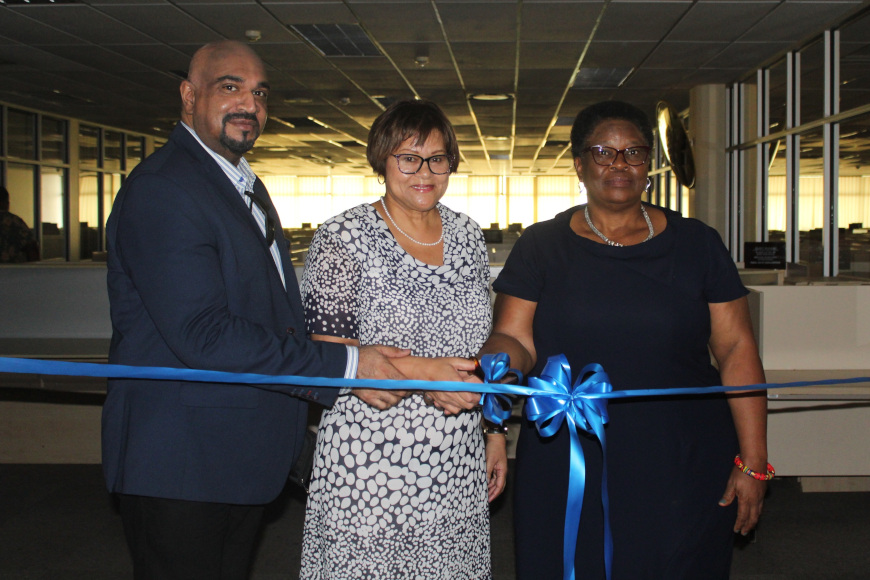The Library and Information Association of South Africa (LIASA) is celebrating South African Library Week from 18 to 24 March 2019 with the theme Libraries: Collaborate @ your library.
According to LIASA, the theme directs action to working together, developing partnerships, indicating that libraries and communities from all walks of life will derive mutual benefits from forging relationships.
In accordance with the celebration of South African Library Week, the Durban University of Technology is celebrating South African Library Week and has begun by hosting its first public lecture by Professor Luyanda Dube at the Alan Pittendrigh Library, Steve Biko campus on 18 March 2019.
In attendance at the event were DUT academic staff, students, academics from various other universities, as well as external stakeholders.
Welcoming the guests to the lecture was DVC: Teaching and Learning (Acting), Professor Theo Andrew, who also re-emphasised the role libraries play.
“At DUT, I know that Mrs Lucille Webster (Director: Library Service) and her team take the library very seriously, and there has been lots of resources put into the library and I’m sure much more can be done. More importantly, it keeps up to base with what’s happening around the world to re – energise the existing connection amongst staff and students,” he said.
Prof Andrew introduced Prof Dube, who delivered her lecture titled: Never Neutral: Decolonised Libraries As A Motor For Expansive Change In Our Lives.
Prof Dube is the Chair in the Department of Information Science at the University of South Africa (UNISA). Her academic career spans over 20 years wherein she taught in several institutions and has published extensively in accredited national and international journals. Her current pursuit is in decolonising knowledge and spearheading transformation of the African information and knowledge for meaningful global impact.
Prof Dube said she was honoured to deliver her lecture as part of the South African Library Week, as well as be a part of the launch of the DUT library space. She congratulated the library team for extending and diversifying its reach as well as being able to witness the prestigious event.
She added that in line with the South African Library theme: Collaborate @ your library, her topic embraces the theme and instigates new ways of thinking as well as to revitalise and stimulate conversations on the importance of libraries.
“Decolonisation is not about separating people according to race, it does not have that negative connotation, instead it’s about inclusivity. Africa faces challenges such as dependency on the West, challenges of war, political instability, poverty, corruption, illiteracy, and many other challenges. Although there are calls that have been made about advancing African Renaissance and renewal, very little has changed,” she added.
Prof Dube spoke about the traditional role of libraries which she added were gateways to knowledge.
“They are repositories to knowledge, they are designed to perform specific functions such as social, educational, recreational and research functions and to enhance development. Also, knowledge is good if its viable and if it allows people to achieve their goals,” she said.
Prof Dube pointed out that colonisation imposed foreign knowledge on Africans and suppressed indigenous knowledge.
“Knowledge is core for economic development, having said that I mentioned that libraries are gateways to knowledge, what is the perception about libraries? There is a view that libraries like religious institutions were at the heart of colonial enterprise. This means that they were used as tools of oppression. There is a strong view also that knowledge continues to be a tool of oppression, resulting in the oppression of other knowledge’s,” she added.
Prof Dube stressed that over the year’s libraries have been challenged to evolve beyond buildings or policies, and to be social institutions.
“In the production of knowledge there is a continued dominance of North – South links and this demonstrates reliance on Western knowledge. I think there is a need to introduce South – South links in terms of knowledge production. There is also a need to facilitate South-North links. I am not suggesting that all Western knowledge is colonising us, I am just advocating for the inclusion of other knowledge’s, including indigenous knowledge. I am advocating for reconsideration of collection development policies like process, procedures and practice,” she added.
Prof Dube said libraries are placed in a critical position. “We can influence the knowledge producers, as we have that power of influence. We need to strengthen the African voice in our collections by procuring more Indigenous knowledge. Indigenous knowledge must not only be recognised but be developed, collected, organised and made accessible. More importantly, as Africans we need to grow from consumers of information to creators of information,” she said.
She stressed the importance of collaboration between libraries, academics, publishers and producers and many other stakeholders.
“Collaboration with communities is important, collaborate at collection development level because as librarians, there’s a lot we need to do, to deconstruct our mental frames and to unlearn and relearn,” she said.
Webster, thanked Prof Dube for her thought-provoking lecture and said it will encourage further discussions on the way forward. “I am hoping as practising librarians and prospective librarians are taking note of it. Our library body, LIASA, have linked up with the UN’s sustainable goals and we are aware of what should be done with our libraries and our spaces,” she said.
Pictured: Prof Luyanda Dube (UNISA), Lucille Webster (Director: Library Service) and Dr Lavern Samuels (Director: International Education and Partnerships), officially cut the ribbon, opening the new library spaces at Alan Pittendrigh library.
Waheeda Peters


